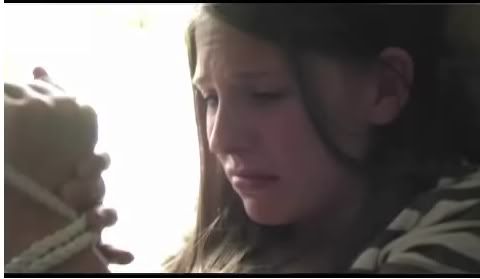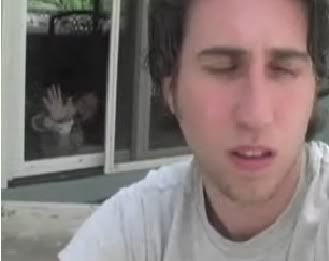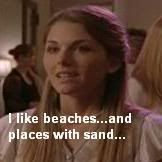TheeBerean wrote:Very well articulated, Renegade. Milowent, your list also brings out a good point. However, there is one key difference in this video than in all of the others: the way the Creators decided to display it.
In all of the above mentioned scenarios, most of the events were talked about rather than shone. Or if they were shone, it was usually pretty tasteful. When Bree's dad was shot, we saw what happened and the camera techniques used emphasized the fear and sudden chaos of the situation. You didn't see him rolling around on the ground in agony with his guts hanging out.
If the Creators wanted a kidnapping to occur it could have been handled so much better. The use of graphic images was simply unneccessary and was totally unjustified by the storyline. (Great examples were posted by Renegade... and I'm sure I could find a few more to rival it). Yes, you could probably find worse on another show or movie, but this is in specific reference to LG15. This is why I say the video crossed a moral line.
TB, I missed this earlier or I would have responded to it then (sorry):
Wouldn't not showing the kidnapping be the unethical move? It would really trivialize the severity of both the situation (the kidnapping of a little kid who was fully aware of what was happening to her) and the moral dilemma surrounding it. If we didn't see Jules in terror and trying to fight back, and it just went straight to her tied up on the floor or something, it would seem like the whole thing is hardly a big deal at all.
Renegade wrote:No, you're misunderstanding me - I have nothing against shades of gray. They make stories far more interesting. But they have to actually exist. That was simply not the case with BD&J.
...
Shades of grey are nothing new in the series. But BD&J aren't grey. They were portrayed as the series's white-point for almost a year, and now, all of a sudden, from one video to another, they're in deep, dark grey. That is what's annoying me, and that is what I consider exceptionally bad continuity.
I don't think they've been portrayed as completely good at all. Especially not Bree, who was going to let Jonas die just because she found that thing in his cabin and didn't want to believe him. All he'd done for her went out the window and she wouldn't even give him a chance. Even if he had been revealed as a villain, the way she reacted was unfair to him. Then there's how she's treated Daniel in the past, which was nothing short of cruel.
Jonas, of course, has had his moment with the gun, and while Daniel's never done anything one would consider an ethical breach in the same vein as those above, I don't really even think that a precedent for dark behavior is necessary to make this thing believable (though Bree certainly has her precedent).
Daniel's probably the moral center of the group, and - as Jonas pointed out - the voice of reason. In his case, I think that's why it's believable that he go along with something like this. I think it's believable either through making a character noble or through demonstrating that they have no problem with doing unethical things. In Daniel's case, he's been rather noble, and in Bree's case, we know she's okay with making decisions like this anyway.
Bree and Daniel's goals are certainly the same, though I can see them probably rationalizing this differently. Seeing what he's seen and knowing what he knows, Daniel felt it was the best thing for Jules, just like Bree. While she can justify it in her mind as "the ends justify the means" or "drastic times call for drastic measures" (she actually said this in a comment on YouTube), though I think Daniel's
too good-hearted to have questioned that it was overall the right move. That's how I see him anyway.
I can see him feeling like it was a terrible thing to do and the right thing to do at the same time.
Renegade wrote:As I've said in one of the video-threads, they should've just followed her when she didn't react well. That way, they could've protected her the moment she was in danger, she'd immediately have seen who's good and who's bad, and everything would've been fine; instead, they compromised their integrity, scared the shit out of her, and pre-proved everything the Order is going to tell Jules about them now.
Good job protecting her.
I would've thought that was a good move if they didn't already feel like she was going to die (which I so hope is what we find out they thought; it's been hinted at previously, so I do think that's what their concern was), but if it was the concern, I wouldn't want to wait that late. Just in case it was in a locked building, or there were tons of guards around. It seems like that's too late in the game to wait for something to go wrong.
Now, I'm not saying that the situation they created went well. It's gone terrible. I just think it was the better choice. In any case, now their only option for protecting her is to try showing up at the ceremony.
Renegade wrote:Lurker wrote:You bring up Jules being an innocent as though that should count as a point against BD&J here, when that is, in fact, a point in their favor! You don't leave an innocent kid in the hands of people you believe will murder her. Not if you want to consider yourself ethically sound.
Err, reality check?
- The Order gave Jules a home, a family, education, and makes her feel special.
- BD&J harassed her online, assaulted her on the street, and kidnapped her right out of her home.
...so far, the Order sounds a lot better than BD&J.
If the Order did all that in the same way one fattens up a turkey for cooking, who sounds better then?
Renegade wrote:Point being: You cannot be the bright, white guardian angel descending from the heavens to protect the innocent child, if you do so like an ork escaped from the darkest pits of hell.
Of course you can do good while doing bad. It depends on the situation. Sometimes it's right, and sometimes it's wrong. In this case, taking her as they did was better in my opinion than waiting until the room for error ws much lower.
Renegade wrote:You say "You don't leave an innocent kid in the hands of people you believe will murder her. Not if you want to consider yourself ethically sound.".
I say: You don't assault and kidnap innocent children. Not if you want to consider yourself ethically sound.
You're including all of the first scenario, but cutting half of that second one off. What you're trying to say here is "You don't kidnap innocent children, not even to take them away from people who you believe will murder them. Not if you want to consider yourself ethically sound." I disagree.
Renegade wrote:As I have said above, they could've just protected her from the backgrounds. The could've intervened when the Order came to get her for the ceremony.
Dude, how would that be any better than this? If terrifying her by going into her house and physically removing her is so awful, how much worse would it have been if they showed up and shot the people who were going to take her to do something she was willing to do, and
then grabbed her?
Renegade wrote:They could've interrupted the ceremony itself.
I've already mentioned why I think that's a bad idea, so I'll move on to the next.
Renegade wrote:They could've left her photos of previous actions done by the Order.
She would have ignored it. She even ignored Bree on the internet.
Renegade wrote:They could've planted a seed of doubt in her mind by innocently asking how much she actually knows about the ceremony.
They'd have to get her to have a conversation with them first.
Renegade wrote:They could've disrupted the Order's plans by spraypainting on her home "YOU ARE ADOPTED".
Okay, I hope that you're joking here. That one makes me want to laugh. XD
In any case, some of your scenarios seem to rely on them having a lot of time, and/or the means to actually approach the ceremony. Since they couldn't count on any of that (and may have even had a suggestion that time was short), the situation was much more complicated.
Renegade wrote:Lurker wrote:Renegade, much worse than a simple abduction is used in fiction now and then - and in those cases, it's not by people who are trying to take the kid away from homicidal psychopaths. It tends to be through-and-through villains doing the abducting most of the time.
Yes. Hence my comment before on how it is a question of relativity - in a law and order show, it is perfectly normal people get kidnapped. So the act itself doesn't have as much of an impact, and it is done by the bad guys.
In this case, we saw Daniel grab and drag out the screaming, crying, innocent child. The good guy Daniel. In a series where the only previous display of an actual kidnapping was blurry, confused, and without resistance.
That is a grave difference.
Well, this relates back to what I said to TheeBerean. It was fine to have the obvious villains abducting the good guys with a blurry, confusing visual. To have then had the heroes abduct an innocent kid in the same manner would have been callous and would have trivialized the severity of what they chose to do.
I think it was important that we actually see Jules terrified of them, and important that we see her fighting back and unable to get away. Not because I enjoyed seeing it happen to her, but because it's honest. It doesn't downplay the moral quandry at hand. It doesn't ask you to dismiss what was happening and just focus on what comes next.
It forced us to look at the act itself and ask "Was that really the right thing?" It asked us to ponder what we would do. It acknowledged on its own that what was happening was horrible, but asked us to consider whether it was also right.
This comment from you makes me still feel like you're uncomfortable with moving away from the archetype. I believe you when you say you can appreciate grey areas, but I get the feeling that you're nonetheless uncomfortable with them when they're not at least presented more gracefully on the part of the good guys.
Maybe that's good, though. For those uncomfortable with it, that's what will get them to ask themselves if it was the right thing.
Renegade wrote:And I don't actually have to ponder that. The worst thing I'd do is break into her house, wait for her, and shut the door, tell her everything I have to say, give her a number to contact me, and then go. 'cause then I'd have told her everything I could tell her, she'd have listened, and, by not hurting her even though I could and giving her my number, I demonstrated that I have no intention to hurt her. She'd stay back, cry her eyes out, and, one or two days later, begin to ponder what I said. Notice how some of the things I said fit the behavior of the Orderites. Up until a point where the Order wants to force her to do something she doesn't want to, and, in her fear and desperation, she dials my number and we take off.
Girl saved, moral integrity preserved, Order fucked. No kidnappings, no assaults, no nothing.
Took me one minute to think of that plan. Now explain why it's absolutely necessary for BD&J to kidnap her?
The potential problems with what you suggested are that she might not listen when she came in and you shut the door (in which case you would have to physically hold her down and cover her mouth anyway just to get her to hear you), and her possible lack of the luxury of several days to think it over.
Renegade wrote:You are missing my point either way. I am talking about artistic responsibility here. No matter whether their actions are right or wrong, BD&J are constantly being shown doing one criminal act after another, yet there is never any consequence.
What message does that send to underaged, minor viewers?
Forgive me for sounding like I'm dismissing your concerns, but
come on.
Let's put things in perspective here: The bad guys have kidnapped children, murdered people (some of them possibly children), brainwashed people (figuratively and literally), operate a religion for the sake of manipulation, and call "Do what I tell you or I kill someone you love" scenarios an excercise in free will. Yet - with the exception of one kidnapper who got shot by another person from the same organization - they've yet to suffer a single negative consequence. The organization as a whole is just peachy.
In fact, we've been told that they have police, corporations and politicians on their side. Added to that, the Order must be absolutely loaded if they can afford to raise thousands of girls in homes around the world from birth to adulthood. They're highly criminal and very successful.
Why aren't you questioning whether there's a message in that? Does it tell people that it's okay to be a criminal because you'll become wealthy and influential, and then get away with anything you want?
Renegade wrote:In this world, you cannot just go and kidnap people. No matter your intentions or reasons. By displaying that as a perfectly reasonable option, and ending it with a happy group hug and new friends, The Creators are basically enticing minor viewers to follow suit and do similarly violent things in real life - they just wanted help, so it'll be alright, right?
In real life, kidnappings have consequences. No matter for what reason they were executed. Hundreds of thousands of cases of "child abduction" each year, where one parent wanted to protect the kids from the other, prove that. The intentions may be right, but there are still consequences. Law is law. Kidnapping is kidnapping. That must have consequences.
You've gone from talking about morality to talking about the law - which does not go hand in hand with ethics. In any case, if you want to talk about laws, there are plenty of times that people should have stood up and said "f**k the law." Laws are supposed to maintain fairness for everyone, and they
should consider intentions. The spirit of a law is more important than the letter, even if that's not how reality operates.
I don't think promoting compliance with an unjust legal situation should be a message sent out by the series any more than you think it should be saying kidnapping is fine. I also don't think it should be saying kidnapping is fine, but I have no problem with it showing a kidnapping committed for the right reasons.
And, you know, there's a reason that people cheered when Al Pacino's character in "... And Justice for All" launched a tirade against the entire court system in the last few minutes of the film, and there's a reason no one protested when Commodore Norrington relented on executing Jack Sparrow in "Pirates of the Caribbean." The average person would like to see compassion be the actual rule of the law.
Instead of asking "What kind of message does this send to people where breaking the law is concerned?" I would be asking why the system isn't more concerned with asking "Why did you commit the crime?" - but that's a question that lays outside LG15 and this discussion.
In any case, give people more credit than that. No one who is old enough to actually pull off a kidnapping and watches this is going to think that LG15's heroes committing a justified one (even if they face no negative consequences for it) means that there's no legal ramifications for them doing the same, or that the morality of it isn't determined by the situation. If they do, it's their parents' fault for not trying to educate them.
Renegade wrote:But they didn't protect her - they assaulted her. They did exactly what they were supposedly protecting her from.
I didn't see her die at their hands.
Renegade wrote:Violence. Force. Fear. They didn't just frighten her a little and told her what's going on. They came into her house, dragged her out, tied her up, and held her prisoner.
Would you stick around there and wait for her parents to show up?
Renegade wrote:No intention in the world can make that "right".
I disagree. If we have to agree to do so, we just will, but their decision remains the morally superior in my eyes.








